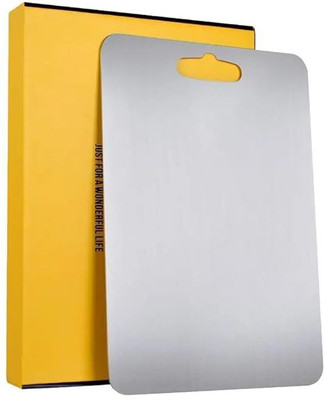darkshri Choping Board Stainless Steel Cutting Board(Silver Pack of 1 Dishwasher Safe)
Quick Overview
Product Price Comparison
A metal chopping board, often made from materials such as stainless steel or aluminum, offers several advantages over traditional wood or plastic cutting boards. Here are some key points to consider if you're thinking about using a metal chopping board:AdvantagesDurability: Metal chopping boards are highly durable and resistant to warping, cracking, and breaking. They can withstand heavy use and are often used in professional kitchens.Hygiene: Metal surfaces are non-porous, making them less likely to harbor bacteria and easier to clean. They can be sanitized more thoroughly compared to wood or plastic boards.Heat Resistance: Metal boards can withstand high temperatures, making them suitable for placing hot pots and pans directly onto the surface without damage.Low Maintenance: They require less maintenance than wooden boards, which need regular oiling to prevent drying and cracking.Aesthetic Appeal: Metal chopping boards often have a sleek, modern look that can complement a contemporary kitchen design.DisadvantagesKnife Wear: Metal chopping boards can be hard on knives, causing them to dull more quickly than wood or plastic boards. Regular honing and sharpening of knives are necessary when using a metal board.Noise: Chopping on a metal board can be louder compared to wood or plastic, which can be an issue in a quiet kitchen environment.Surface Damage: Over time, metal boards can develop scratches and dents from regular use, which may affect their appearance and possibly their hygiene if the surface becomes uneven.Weight: Metal chopping boards can be heavier and less portable than their wood or plastic counterparts.Best UsesCommercial Kitchens: Ideal for environments where hygiene and durability are paramount.High-Temperature Cooking: Suitable for kitchens where hot items frequently need a resting surface.Specialized Tasks: Great for tasks that don't involve extensive chopping, such as serving or working with dough.Care TipsCleaning: Wash with warm soapy water after each use and dry thoroughly to prevent water spots.Knife Maintenance: Keep your knives sharp to minimize the wear and tear on both the knives and the board.Avoid Abrasives: Use non-abrasive sponges or cloths to clean to avoid scratching the surface.By considering these factors, you can decide whether a metal chopping board is suitable for your cooking needs.VKN Trade Link


